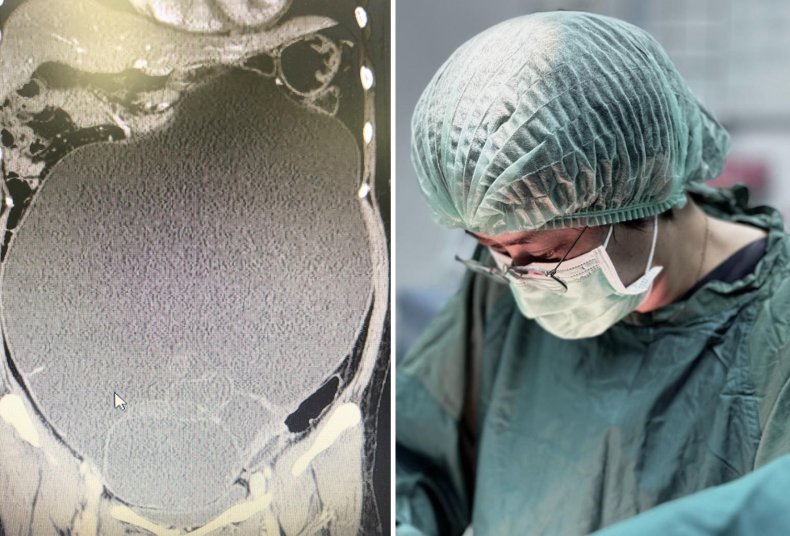A woman who went to hospital after gaining weight was found to have a massive 20-pound cyst inside her ovaries. The cyst, which was removed by doctors and turned out to be cancerous, measured around 9.4 inches by 13.4 inches.
"I had just finished with a case concerning ovarian fluid. At first I suspected that this patient was just obese, however others wanted to check further. I found the same case, but the ovarian fluid that I found was bigger than the previous case, weighing more than 9 kilograms (19.8 pounds)!!!" a doctor from Bueng Kan Hospital in northeast Thailand in wrote in a translated post on Facebook, which also contained images of the cyst.
"In this case, the patient thought that she had just put on weight, but when it felt like there was a lump on the abdomen, we checked the body and it was found that it was a water bag (cyst) on the right ovary of about 24x34 cm."

Ovarian cysts are fluid-filled sacs that develop on an ovary, usually only around the size of a cherry. They are relatively common, and usually go away naturally without any symptoms. Only cysts that get larger, or that rupture, are an issue, with around 8 percent of pre-menopausal women developing large cysts that need treatment.
Larger cysts can cause pain in the abdomen, painful during sex, and an increased urge to urinate, as well as leading to menstrual issues such as heavy or irregular bleeding.
If the cyst ruptures, it can leak fluid into the body cavity, which may be painful, but only needs surgery if the rupture causes bleeding. Larger cysts may also lead to ovarian torsion, which is when the ovary becomes twisted around surrounding tissue. This can be very painful, accompanied by nausea and vomiting, and risks cutting off the blood supply to the ovary, which may cause the organ to slowly die, so surgery is usually required to amend the issue.

Some ovarian cysts may also become cancerous, but this is fairly uncommon: The National Institutes of Health estimates that 5 to 10 percent of women have surgery to remove an ovarian cyst, but that only 13 percent to 21 percent of these cysts are cancerous.
Usually, cysts that need removing are taken out via laparoscopy, but larger or cancerous cysts may need more invasive surgery to remove, and may require the affected ovary being removed too, or even the uterus as well. Laparoscopy is a surgical procedure that precludes the need for large incisions.
The Thai woman's cyst was successfully removed without rupturing, although it was found to be cancerous.

"The doctor removed all the water bag and the uterus because the risk of cancer was found. It took about one hour and 30 minutes, and the surgery was successful," read the hospital's Facebook post.
Two conditions that may make ovarian cysts more common and affect fertility include endometriosis, where the uterine lining forms outside of the uterus, and polycystic ovary syndrome (PCOS), where many small cysts grow on the ovaries. PCOS is thought by the World Health Organization to affect around 4 percent of women, though other studies report this rate as being higher.
Do you have a science story to share with Newsweek? Do you have a question about ovarian cysts? Let us know via science@newsweek.com.








